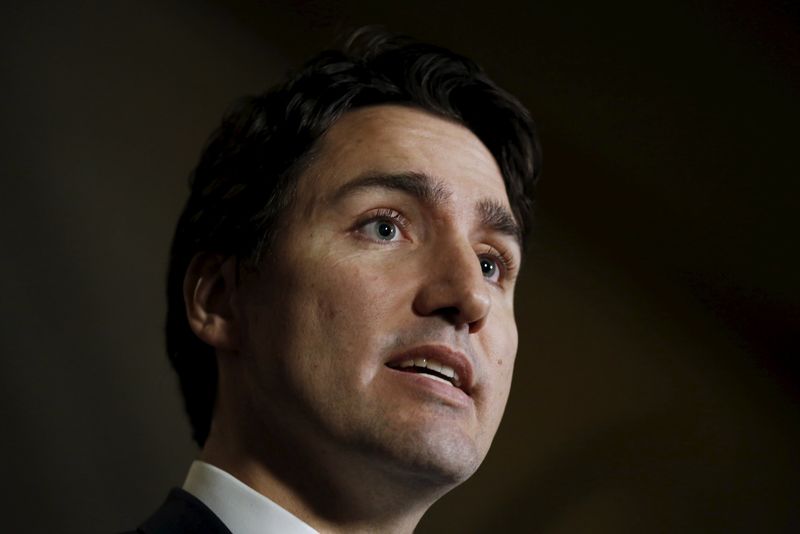(Adds Trudeau remarks at news conference, estimate of insurance
cost)
By Ernest Scheyder
BONNYVILLE, Alberta, May 13 (Reuters) - Canadian Prime
Minister Justin Trudeau praised firefighters on Friday for
defending the energy hub of Fort McMurray and promised the
federal government would pour money in to its recovery.
Trudeau toured the town in a military helicopter and saw a
patchwork of neighborhoods destroyed by an inferno that forced
the evacuation of all 88,000 inhabitants. Some homes still
stood, while others had burned to their foundations.
The inferno closed the extensive oil sands operations near
the town and the effort to restart them is progressing slowly.
The wildfire knocked out nearly half, or 1.07 million barrels
per day (bpd), of Alberta's oil sands capacity.
The blaze could cost insurers as much as C$6 billion ($4.7
billion), making it by far the most expensive Canadian natural
disaster, according to ratings agency DBRS.
"To the people of Fort McMurray: Know that even though
things may look difficult and uncertain and at times perhaps
almost hopeless, know that you are not alone. Canadians are
standing with you," said Trudeau.
"There will be significant federal monies invested in that
community as we rebuild," he told a news conference in the
provincial capital Edmonton.
Ottawa runs a fund to help provinces recover from disasters
and could end up paying 90 percent of all eligible costs.
Trudeau said the government would try to ensure the money was
paid out more quickly than usual but gave no details.
After the aerial tour, he was briefed on progress fighting
the fire, which has moved east of Fort McMurray into less
inhabited areas, and praised emergency officials for their
"valor and courage" in preserving much of the town.
"The work you did to save so much of this community, to save
so much of this city and its downtown core ... was
unbelievable," he said.
Trudeau has faced criticism in Alberta, a province that does
not usually vote for his party, for waiting more than a week to
survey the damage. He initially stressed he did not want his
visit to interfere with firefighting efforts.
"I think it's a good thing he's coming," said Fort McMurray
housekeeper Maureen Pearce at a supply center for evacuees in
Lac La Biche, Alberta. "I hope he provides more aid."
Many of the evacuees are living in temporary accommodation
across the province, while authorities work to restore power,
gas, water and communications.
Local officials say it will be 10 days before they can even
produce a plan for resettlement, much less allow people to
return to a place where small fires are still erupting.
CHALLENGES OF REBUILDING A DAMAGED TOWN
Rebuilding Fort McMurray "is the work of years," Alberta
Premier Rachel Notley told the news conference.
Evacuees are collecting Alberta debit cards loaded with
C$1,250 per adult and C$500 per dependent, as well as Canadian
Red Cross aid of C$600 for each adult and C$300 for each child.
Pearce, who believes both her home and the hotel where she
works survived the fire, said the emergency funds are helpful.
"But if we're going to be out of our homes for a month,
we'll need more," she added.
The fire on Friday was 12 km (7.5 miles) from
ConocoPhillips (NYSE:COP)' COP.N Surmont oil sands site, which is 63 km
(39 miles) southeast of Fort McMurray, and it had not advanced
since Thursday morning, spokesman Rob Evans said. He said
operations would be on hold until Alberta allowed people to stay
overnight at Surmont's camp.
The inferno is a blow to Alberta's economy, which was
already reeling from collapsing oil prices. But even so,
portfolio managers see value in Alberta's government bonds,
anticipating the province will rebound.
Four major oil firms operating in the area around Fort
McMurray have declared force majeure, a contract clause to
remove liability for unavoidable catastrophes.
The fire spans 241,000 hectares (596,000 acres), growing
much more slowly than before.
($1=$1.29 Canadian)
(With additional reporting by Nia Williams in Calgary, Liz
Hampton in Houston, Matt Scuffham in Toronto and David Ljunggren
in Ottawa; Writing by Rod Nickel and David Ljunggren; Editing by
Cynthia Osterman)
